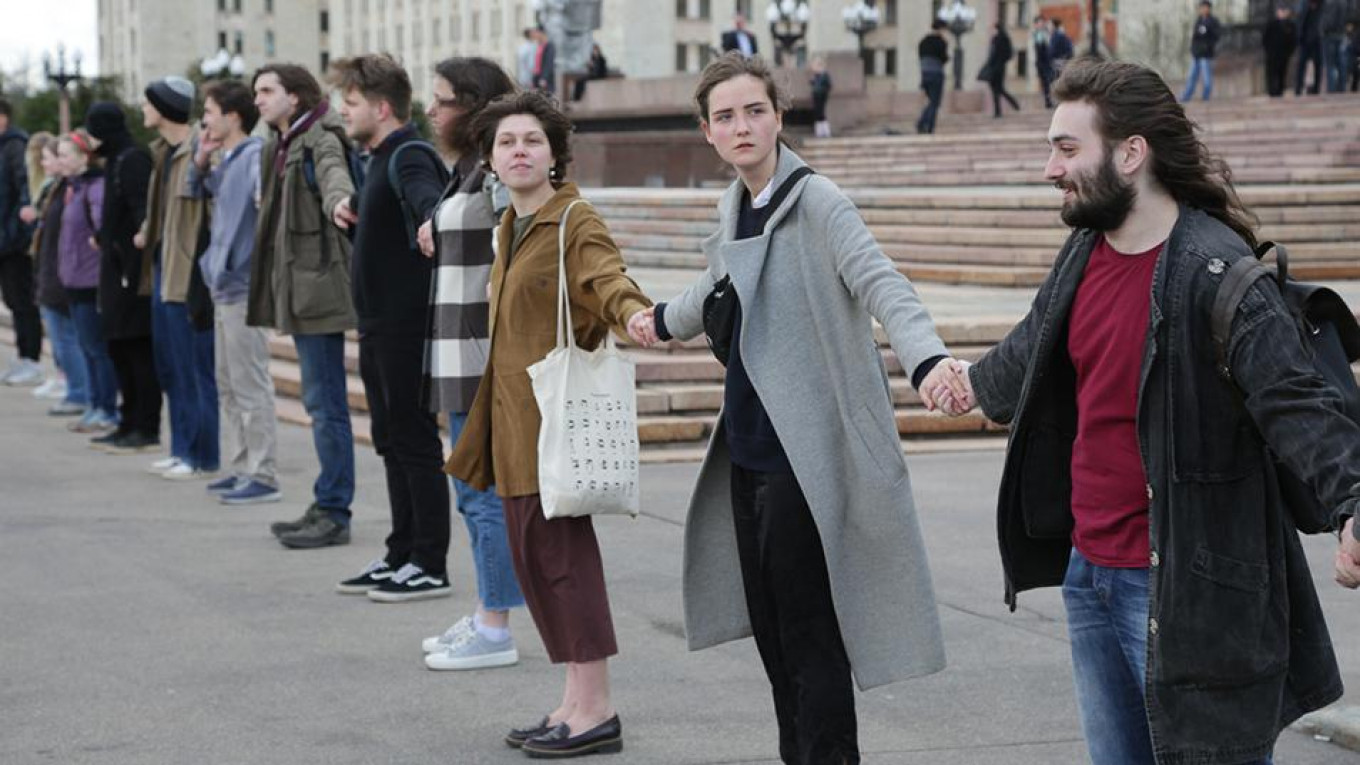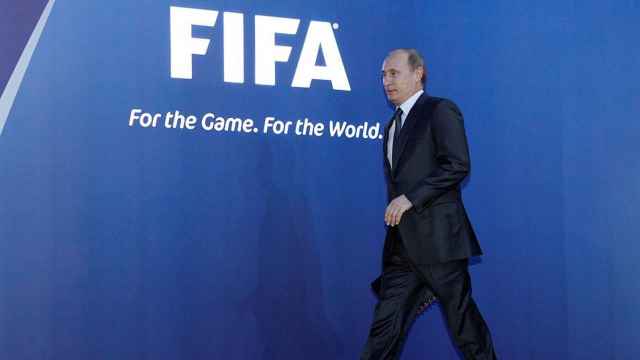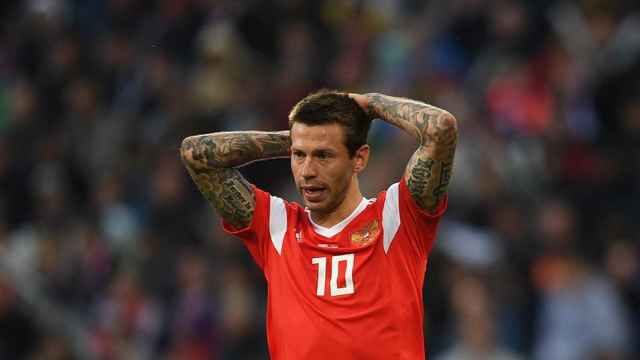A few meters from the imposing entrance of Russia’s most prestigious university, the sound of bulldozers tearing down trees is echoing across the historic campus.
In just a few short weeks, some 25,000 football fans from across the world are due to descend here to watch FIFA World Cup matches on a giant screen, and preparations for their arrival are in full swing. There’s just one problem: Their arrival coincides with the students' exams.
“Usually, if someone is too loud, the police come and the noise stops,” Artyom Yegorov, a second-year physics student at the university told The Moscow Times. "With the fan zone, the police won’t really be able to subdue 25,000 fans."
The decision to host a World Cup fan zone at Vorobyovy Gory, on the edge of the Moscow State University campus, was announced in late 2016, and since summer last year students have been campaigning to have it moved.
But with less than a month to go until the first match, the students’ pleas have been met with silence from city and university officials. In a last ditch effort to have their voices heard and the decision reversed, they are taking their protest to the street.
Plan B takes center stage
When Russia won the bid to host the 2018 World Cup in December 2010, organizers planned for Moscow’s World Cup fan zone to be on Red Square. But that plan fell through because, according to Russian media reports, Red Square could not fit the required 40,000 fans and because alcoholic drinks could not be sold there, which goes against FIFA’s obligations to its sponsors. The city chose Plan B: Vorobyovy Gory.
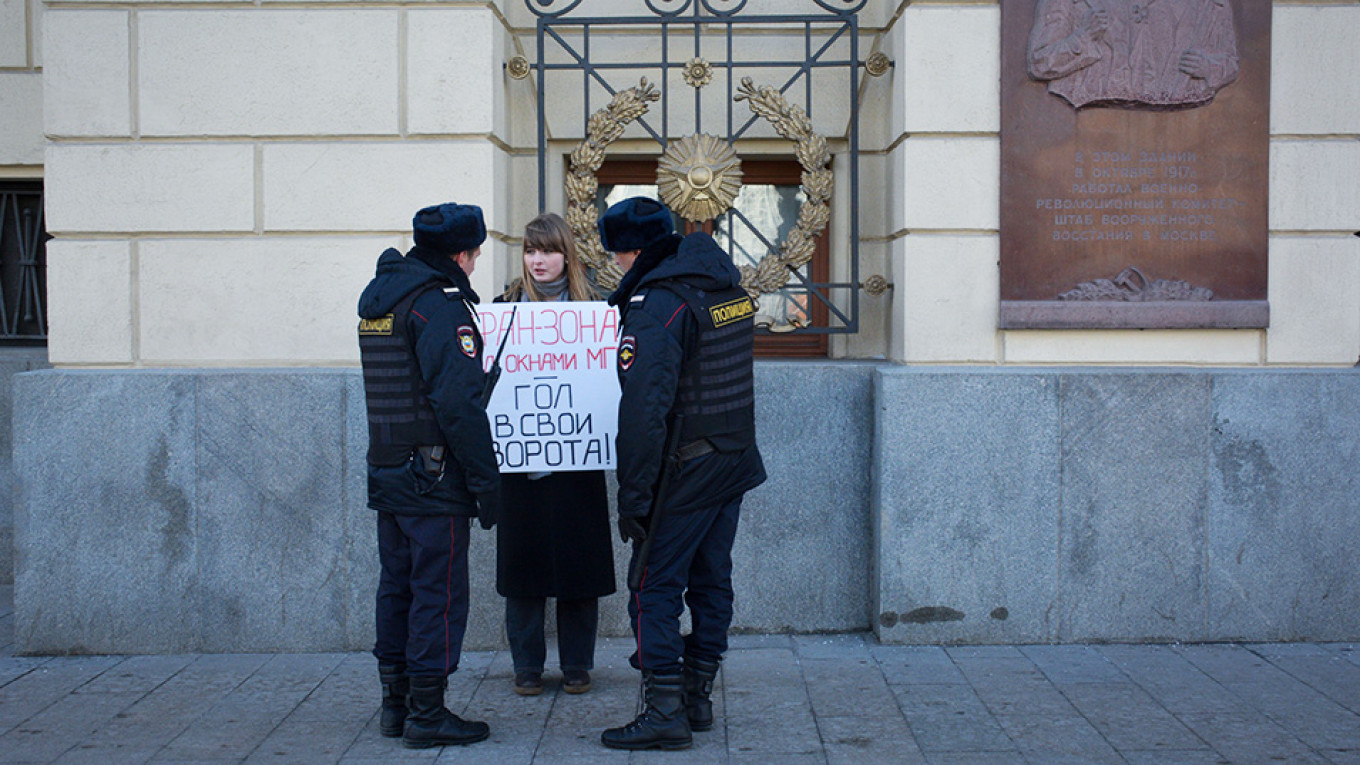
Set on one of the city’s highest points and surrounded by lush greenery, the site is famous for its viewing platform looking out over Moscow’s skyline, the winding Moskva River and the recently renovated Luzhniki Stadium — the crown jewel of Russia’s World Cup.
The ticketed fan zone, which will be open for the duration of the World Cup, will be equipped with a giant screen and beer stalls that will stay open late into the night. Just 300 meters away, however, is the Moscow State University’s main, 34-story building — home to several faculties, lecture halls, offices, private apartments and dormitories for 6,000 students.
“The World Cup coincides with the most difficult and stressful time in the whole academic year: exams,” Maria Cheremnova, a Moscow State University physics student, told The Moscow Times. “It will be impossible to calmly prepare in these conditions.”
For many students enrolled at the university, whose alumni include Soviet leader Mikhail Gorbachev, noise is not the only concern. Even access to the university, which will be fenced off during the World Cup to prevent football fans from getting into the area, could become more difficult; professors and students will need special passes to access lecture halls and residence rooms.
“I worry that during exams there might be issues getting into the university itself,” a Moscow State University professor, who asked to remain anonymous for fear of backlash from his employer, told The Moscow Times. “There will be long lines at gates during morning rush hour before exams.”
Students, many of whom live off campus, will also have to share their commutes with bawdy fans, traveling from the city center to Luzhniki, with a capacity of 75,000 — just a stop away from Vorobyovy Gory.
The sheer number of people expected to use the metro has physics student Cheremnova worried about a “transport collapse.” In short, “the consequences of holding a fan festival on Vorobyovy Gory will be terrible,” she said.
Students interrupted
In what looked like an attempt at reconciliation, the university administration announced in February that exams would be rescheduled so students would be able leave campus before the World Cup kicks off.
Students protested cutting the semester short by staging an “Occupy Rectorate” protest on the ninth floor of the main university building, which was joined by 87 people at its peak. The university rector capitulated and agreed to move the exam schedule back.
Since, however, only prominent faculties like chemistry and physics have actually stuck to the original exam schedules. Smaller faculties will sit their exams early, despite the rector’s promise.
In the meantime, students working in the university laboratories are discovering that, even weeks ahead of the first match, the World Cup is making life more difficult.
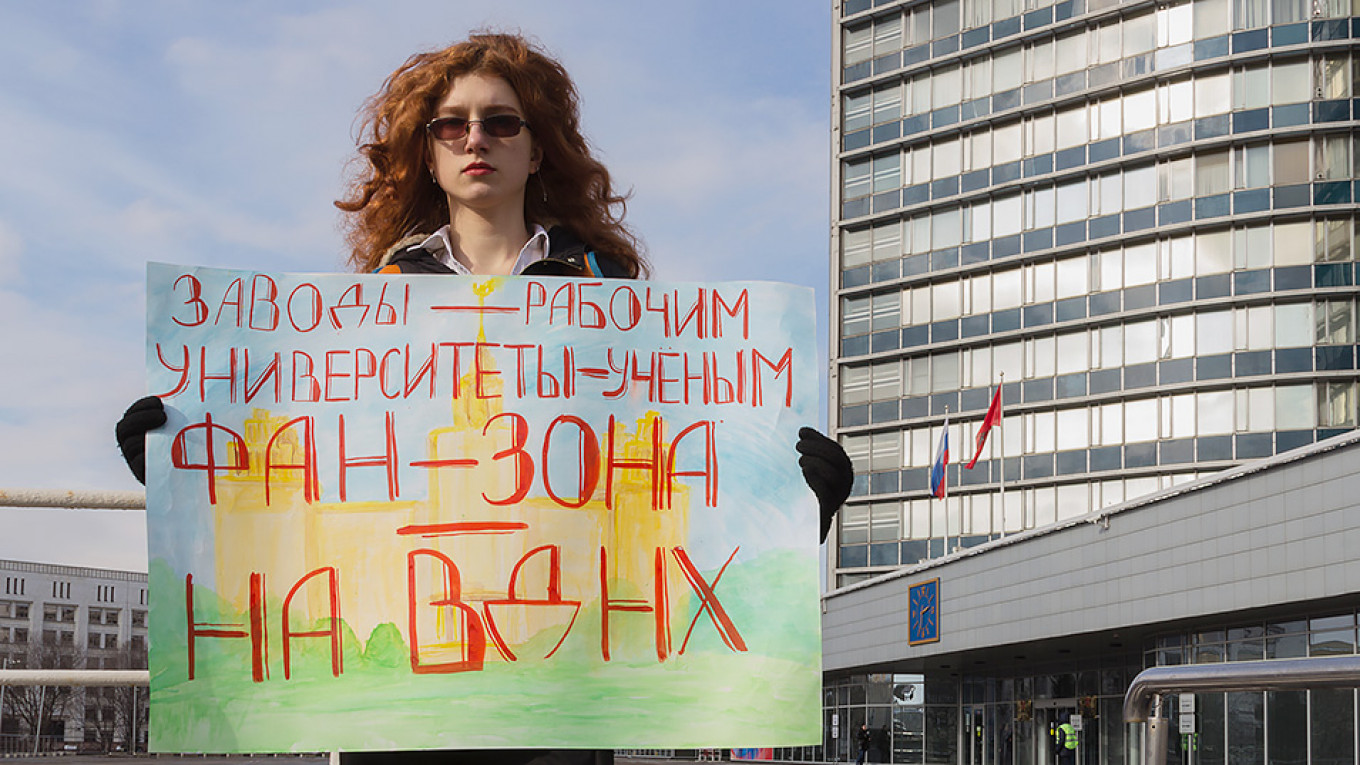
Strict safety codes in place for the World Cup outlined in a presidential decree from May last year include barring potentially dangerous and radioactive chemicals from being brought near World Cup sites, forcing lab students to put their work on hold.
“Everyone in the chemistry faculty is tearing their hair out,” Zamyatin said. “Suddenly, they have to stop their work because of football.”
The forced stalling of laboratory work will do “irreparable harm” to some students' careers, argues physics student Yegorov, who works as a lab assistant. “And I just think that a laboratory is much more important than to have a fan zone over here.”
Acts of 'desperation'
Students have appealed to Russia’s Local Organizing Committee and proposed as an alternative VDNKh, a giant Soviet-era outdoor exhibition space covering over 13 kilometers meters squared, built to host agricultural fairs.
They also sent a letter to the presidential administration with 4,500 signatures asking for the relocation of the fan zone. In a reply seen by The Moscow Times, the administration instead promised to look into getting them tickets to a Russia-Brazil friendly match in Luzhniki at the end of March.
Speaking to The Moscow Times, the students expressed frustration at the fact no public hearings have been held on the issue, and that at least seven requests to stage legal protests were rejected by City Hall, denying them a say.
“This is the way that the Moscow authorities work,” said Zamyatin. "They don’t think it necessary to explain anything to anybody."
City Hall and Moscow State University did not respond to written requests for comment from The Moscow Times regarding students’ concerns or the location of the fan zone. In a written response, FIFA spokesperson Thayssa Plum said that the location of fan zone venues is the prerogative of the host city, so long as the venue meets FIFA’s standard requirements.
“The wellbeing and a reduced impact in the daily routine of the MSU students during the FIFA fan fest is a priority for FIFA, the 2018 FIFA World Cup Local Organizing Committee and Host City Moscow, who hold regular meetings with the MSU administration,” Plum added.
On April 28, with frustration mounting, the students staged a last-minute unsanctioned protest. More than 200 students lined up outside the main building and held hands to form a “human shield.”
“It was in a lot of ways this gesture of desperation,” Zamyatin said. “When nobody listens to you at all, you start coming out on the streets.”
Then, on May 22, around 80 students held another protest against the fan zone in the main university building. With tensions escalating, this protest brought with it police intervention: A singer in a band participating in the protest was briefly detained for allegedly harassing a cleaning lady.
With just weeks to go until tens of thousands of fans land on the university’s doorstep, the students are determined not to give up until the Local Organizing Committee issues a final statement. Few, however, believe the decision will be reversed.
“Unfortunately, the administration of my university is offering its students and employees just one option: be silent and to obediently accept these inconveniences,” the professor who asked to remain anonymous told The Moscow Times.
“We are being told to trust the wise leadership which is supposedly doing everything possible to minimize the harm of the fan zone," he said. "But from where I stand it looks like the administration is putting all its effort into suppressing unhappy students instead of solving the problem.”
A Message from The Moscow Times:
Dear readers,
We are facing unprecedented challenges. Russia's Prosecutor General's Office has designated The Moscow Times as an "undesirable" organization, criminalizing our work and putting our staff at risk of prosecution. This follows our earlier unjust labeling as a "foreign agent."
These actions are direct attempts to silence independent journalism in Russia. The authorities claim our work "discredits the decisions of the Russian leadership." We see things differently: we strive to provide accurate, unbiased reporting on Russia.
We, the journalists of The Moscow Times, refuse to be silenced. But to continue our work, we need your help.
Your support, no matter how small, makes a world of difference. If you can, please support us monthly starting from just $2. It's quick to set up, and every contribution makes a significant impact.
By supporting The Moscow Times, you're defending open, independent journalism in the face of repression. Thank you for standing with us.
Remind me later.


